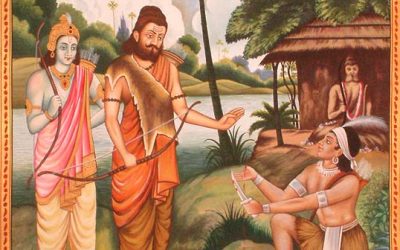
There is a type of detachment or renunciation that occurs when we are baffled in our attempts at enjoyment. There are three allegories that illustrate this point.
Allegory 1: Sleeping on the Floor When The Bed is Broken
This is an allegory taken from Upākhyāne Upadeśa authored by a great Vaiṣṇava saint and ācārya Śrīla Bhaktisiddhānta Sarasvatī Ṭhākura.
A man was gifted a good-looking but cheap, flimsy bed during his marriage by his in-laws. He started sleeping on it and found out that he was cheated. Soon enough, the bed broke and he fell to the floor. He was a poor man. He could not afford another bed. So he started sleeping on the floor. So just to save his face, he began speaking as if he was a renunciant and even preached that everyone should give up their comfortable life such as a soft bedding which was temporary and take to austerity and renunciation like sleeping on the floor and expounded the benefits of sleeping on the floor.
Allegory 2: Sour Grapes
This is quite a famous allegory from the Hitopadeśa, a Vedic compendium of allegories for moral instruction.
 A fox tried to jump and catch some grapes from a grape tree. However hard he tried, he never reached them. Being frustrated at his attempts, he finally concluded that the grapes were sour and left the place.
A fox tried to jump and catch some grapes from a grape tree. However hard he tried, he never reached them. Being frustrated at his attempts, he finally concluded that the grapes were sour and left the place.
Allegory 3: Crematorium Realization
The relatives of a deceased person attended his funeral at the crematorium. After they had gone through all the rituals, they spent some sombre moments together and began to discuss among themselves the temporary nature of life and the futility of material endeavors which ultimately end in death. After spending some time in such philosophical discussions, the time came for them to leave the crematorium. Then each of them left the place and eventually got busy with their own lives, in the same materialistic pursuits that they condemned in the crematorium.
PRETENTIOUS RENUNCIATION
Every materialist wants to gratify his senses to the greatest degree. This is called lust. In the Bhagavad-gītā, lust is likened to a fire which devours all the fuel that is supplied to it, becomes bigger and thereby becomes hungry for even more fuel. Just as one cannot satisfy fire by supplying fuel to it, one cannot satisfy lust, which burns just like fire, by supplying sense objects to it.
So at one point, when the endeavor for sense gratification becomes baffled or frustrated, one becomes angry and hates the very thing that he was after. At this point, one may speak of detachment exactly like a renunciate but he would not have spoken thus if he was not baffled in his attempts at sense gratification. He would have continued to enjoy those objects if they were of no trouble to him. This is called opportunistic renunciation.
This is not actually renunciation because the desire for sense gratification has not been uprooted and it will again grow at the slightest opportunity. Renunciation that is fuelled only by a temporary lack of material happiness does not stay for long.
The Bhagavad-gītā informs us that material happiness and distress come and go just like seasonal changes. In harsh winter or harsh summer, we can observe that all life forms become more or less inactive. The trees lose all their leaves in winter or get parched in summer. But just as autumn arrives, all life forms resume their activities.
There are many impersonalist svāmīs, yogīs, bābās, monks, etc. who do not believe in the Personality of Godhead. They usually speak of renunciation. Their reason for renunciation is mainly due to the fact that the material world is not a very enjoyable place. They say that this material world is unreal or illusory and thereby give it up. They may thus become famous renunciates.
But after some time, they come back to the same material sphere to take up philanthropic, altruistic or political causes. This is nothing but sense gratification in an extended manner. They want to satisfy the senses of the masses. If the senses and the entire material world is unreal, then why do they take up material activities that are meant to serve the senses of people? That means their renunciation is not complete. They cannot give up this material world because they can not give up the deep-rooted desire for sense gratification.
This tantamounts to pretension. In the Bhagavad-gītā (3.6), it is said,
karmendriyāṇi saṁyamya
ya āste manasā smaran
indriyārthān vimūḍhātmā
mithyācāraḥ sa ucyate
“One who restrains the senses and organs of action, but whose mind dwells on sense objects, certainly deludes himself and is called a pretender.”
THE HIGHER TASTE
On the other hand, the renunciation of a Kṛṣṇa conscious person is on a completely different platform. Even with complete facility for sense gratification and the power to enjoy it, he will not enjoy such pleasures. His renunciation is based on his superior engagement in devotional service which effects pure knowledge, not an incidental frustration in sense gratification. This is confirmed in Bhagavad-gītā (2.59) as follows:
viṣayā vinivartante
nirāhārasya dehinaḥ
rasa-varjaṁ raso ‘py asya
paraṁ dṛṣṭvā nivartate
“The embodied soul may be restricted from sense enjoyment, though the taste for sense objects remains. But, ceasing such engagements by experiencing a higher taste, he is fixed in consciousness.”

A practical example is given by Śrīla Yāmunācārya, a great saint and devotee, who says:
yad-avadhi mama cetaḥ kṛṣṇa-pādāravinde
nava-nava-rasa-dhāmany udyataṁ rantum āsīt
tad-avadhi bata nārī-saṅgame smaryamāne
bhavati mukha-vikāraḥ suṣṭhu niṣṭhīvanaṁ ca
“Since my mind has been engaged in the service of the lotus feet of Lord Kṛṣṇa, and I have been enjoying an ever new transcendental pleasure, whenever I think of sex life with a woman, my face at once turns from it, and I spit at the thought.”
UNLIMITED PLEASURE WITH KṚṢṆA
In the Padma Purāṇa also it is said:
ramante yogino ‘nante satyānanda-cid-ātmani
iti rāma-padenāsau paraṁ brahmābhidhīyate
“The mystics derive unlimited transcendental pleasures from the Absolute Truth, and therefore the Supreme Absolute Truth, the Personality of Godhead, is also known as Rāma.”
Lord Ṛṣabhadeva also describes spiritual pleasure as brahma-saukhyaṁ tv anantam — unlimited. Śrī Caitanya Mahāprabhu also described the pleasure of chanting the holy name of Kṛṣṇa as ānandāmbudhi-vardhanaṁ prati-padaṁ pūrṇāmṛtāsvādanaṁ — an ever-increasing ocean of transcendental bliss.
Kṛṣṇa consciousness is such a transcendentally nice thing that automatically material enjoyment becomes distasteful in comparison. It is owing of this reason that a devotee of Kṛṣṇa can steadily reject the idea of sense gratification.
PURE KNOWLEDGE
📷
Such transcendental pleasure is based on pure knowledge. Pure knowledge entails the understanding that only the Supreme Lord is the proprietor of everything and that everything is meant for His pleasure. Enjoying the property of someone else without permission, acknowledgement and gratitude constitutes thievery. Just as a thief is always in anxiety, a sense gratifier is always in anxiety because he is nothing but a thief, trying to enjoy things that are meant for the enjoyment of the Lord.
Śrī Īśopaniṣad (1) documents the proprietorship of everything.
īśāvāsyam idam sarvaṁ
yat kiñca jagatyāṁ jagat
tena tyaktena bhuñjīthā
mā gṛdhaḥ kasya svid dhanam
“Everything animate or inanimate that is within the universe is controlled and owned by the Lord. One should therefore accept only those things necessary for himself, which are set aside as his quota, and one should not accept other things, knowing well to whom they belong.”
In the Bhagavad-gītā (5.29) also Lord Kṛṣṇa stresses that He is the proprietor of everything — sarva loka maheśvaram.
THE YUKTA-VAIRĀGYA PRINCIPLE
📷
So knowing the Lord’s proprietorship over everything including himself, and being thoroughly contented in his constitutional position of being a loving servitor of the Lord, a devotee of Kṛṣṇa can be in the midst of all enjoyable things but never accepts a farthing for his own enjoyment. On the other hand, he uses everything for the pleasure of Kṛṣṇa. Śrīla Rūpa Gosvāmī explains in his book Bhakti-rasāmṛta-sindhu (2.255-256), this unique renunciation of a devotee as yukta-vairāgya.
anāsaktasya viṣayān
yathārham upayuñjataḥ
nirbandhaḥ kṛṣṇa-sambandhe
yuktaṁ vairāgyam ucyate
prāpañcikatayā buddhyā
hari-sambandhi-vastunaḥ
mumukṣubhiḥ parityāgo
vairāgyaṁ phalgu kathyate
“When one is not attached to anything, but at the same time accepts everything in relation to Kṛṣṇa, one is rightly situated above possessiveness. On the other hand, one who rejects everything without knowledge of its relationship to Kṛṣṇa is not as complete in his renunciation.”
Yukta-vairāgya is a very important phrase coined by Śrīla Rūpa Gosvāmī. In fact, as Rūpānugas, as followers of the footsteps of Śrīla Rūpa Gosvāmī, our entire mission of propagating Kṛṣṇa consciousness is based on this principle. In our Kṛṣṇa consciousness society, we accept or use all kinds of things that the materialists may use, like buildings, cars, computers, smartphones, internet, aeroplanes, practically everything; but not in the spirit of enjoying them but using them to further the Kṛṣṇa consciousness movement in order to help the suffering humanity.
Yukta means attachment; vairāgya means detachment. This attached-detachment means that the attachment is for Kṛṣṇa. Being engaged in the superior attachment to Kṛṣṇa, the unlimited reservoir of pleasure, the devotee is detached from the inferior spirit of sense enjoyment. Instead of being forcibly detached from the objects of sense gratification, he is detached from the very principle of sense gratification.
So instead of starving the mind and senses of their enjoyable objects, a Kṛṣṇa conscious person fills his mind and senses with Kṛṣṇa consciousness and thus boldly uses everything in the spirit of service to Kṛṣṇa, without fear of being entangled. In this way, he is completely at peace, not being agitated by the otherwise impetuous senses.
There is a beautiful prayer by a devotee named Yāmunācārya that elucidates this peaceful condition.
bhavantam evānucaran nirantaraḥ
praśānta-niḥśeṣa-mano-rathāntaraḥ
kadāham aikāntika-nitya-kiṅkaraḥ
praharṣayiṣyāmi sa-nātha-jīvitam
“By serving You constantly, one is freed from all material desires and is completely pacified. When shall I engage as Your permanent eternal servant and always feel joyful to have such a perfect master?”
THE COMPARISON — IRON vs GOLD
In conclusion, the renunciation of an impersonalist or a nondevotee of Kṛṣṇa is a product of frustration or hatred. Both rāga and dveṣa, or affection and hatred, are two sides of the same coin. The centre is sense gratification.
This opportunistic renunciation is, however, a favorable starting point towards perfect renunciation because it makes one question the nature of one’s very existence, which can then spur the quest for perfect knowledge. But unless such an inquisitive person is blessed by the contact of a pure devotee of Kṛṣṇa, he cannot become mature in his renunciation and will invariably fall back to sense gratification owing to not being thoroughly conversant with spiritual science.
The pure devotee has neither attachment nor hatred towards anything as he sees everything in relation with the Lord. Such a person easily gives up sense gratification, the root of all trouble.
The exalted position of a pure devotee of Kṛṣṇa is explained in the following verse from Śrīmad Bhāgavatam (11.2.50):
na kāma-karma-bījānāṁ
yasya cetasi sambhavaḥ
vāsudevaika-nilayaḥ
sa vai bhāgavatottamaḥ
“One who has taken exclusive shelter of the Supreme Lord, Vāsudeva, becomes free from fruitive activities, which are based on material lust. In fact, one who has taken shelter of the lotus feet of the Lord is freed from even the desire to enjoy material sense gratification. Plans for enjoying sex life, social prestige and money cannot develop within his mind. Thus he is considered bhāgavatottama, a pure devotee of the Lord on the highest platform.”
One should, therefore, not be confused between the two types of renunciation and consider them the same. It is like the difference between iron and gold. [End]




0 Comments